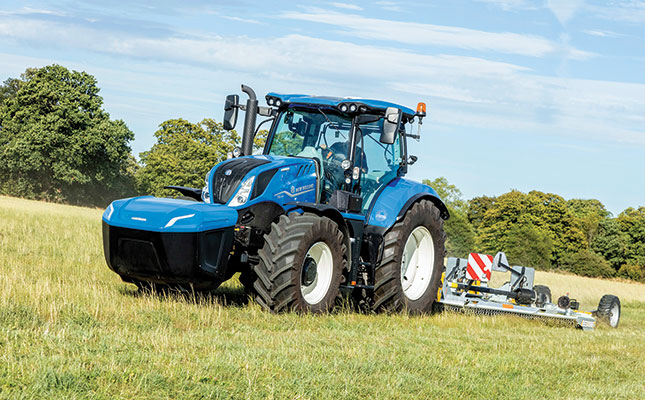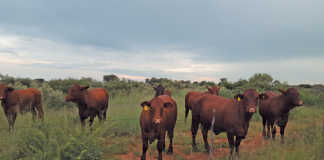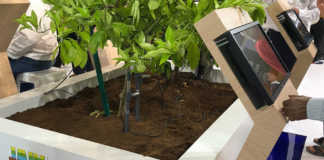
Photo: Supplied
The sale of agricultural machinery has boomed in South Africa over the past two years, according to the sales reports published by the South African Agricultural Machinery Association.
Jaco du Preez, marketing manager for New Holland in Southern Africa, says that the boom in sales is largely due to the high prices of commodities. Favourable weather conditions have also seen local farmers produce bumper maize, wheat and soya bean crops, while the Russia-Ukraine conflict has driven the prices of these commodities even higher.
“There is a lot of opportunity for farmers to export their produce to international markets. While exporting to Europe is becoming more difficult, due to the Russia-Ukraine war, there is still plenty of opportunity for farmers to export commodities to other countries in Africa,” says Du Preez. He adds that South Africa is in a good position to assure not only its own food security, but also to improve the food security of other countries on the continent.
“Farmers have produced high yields of good-quality crops over the past few years. Therefore, their cash flow is much better now than it has been for a while. We see this in the boom in machinery sales; farmers buying machinery is an indication of good yields.
“This is a good opportunity for farmers to invest in machinery with improved technology, as they are currently in a position to afford this.”
In 2020/21, New Holland saw a particular jump in the sale of combine harvesters, with a market of around 300 units in this year alone.
Despite the surge in commodity prices, Du Preez adds that it’s likely that the end of the commodity super-cycle is nigh. This is particularly in light of discussions around Russia allowing exports from Ukraine to pick up again.
Going green
New Holland has become a well-known staple on the South African agricultural machinery market.
The brand’s product line is extensive, and includes tractors, combine harvesters, balers, forage harvesters, self-propelled sprayers, haying tools, seeding equipment, utility vehicles and implements, and grape harvesters, among others.
With farmers being under increasing pressure to produce more with less, New Holland has been a leader in driving this trend in the agricultural machinery space, and is producing machinery with advanced technology aimed at precision farming.
Du Preez says that the biggest trend driving research and development at New Holland is the push towards climate change mitigation. In particular, this includes ‘going green’.
“Going green is one of the reasons CNH Industrial [which New Holland falls under] recently acquired Raven Technologies in the US. Raven Technologies specialises in precision technology, as well as analysis of data. This allows for better efficiency in terms of weed identification, for example, which allows for a reduction in the use of chemicals and fertilisers. Ultimately, this reduces a farmer’s carbon footprint and the effect of agricultural production on the environment.”
Going green in the machinery industry includes designing machinery and equipment that run on alternative fuels, such as biofuels.
In this regard, New Holland developed a hydrogen-powered tractor in 2012. However, this tractor never made it to the commercial market.
“The hydrogen tractor didn’t take off because of the risks involved in compressed hydrogen. It is still used on CNH Industrial’s zero-emissions farm in Italy, but is unlikely to be released commercially.”
However, New Holland launched a tractor powered by compressed methane in 2021, which is easy and safe to use. The T6 Methane Power tractor will be launched in South Africa in 2023.
According to New Holland, the T6 Methane Power runs on an all-new 6,7- litre engine, and produces 145 hp.
“The T6 Methane Power tractor can match the power of its diesel equivalents, with the benefits of reduced input costs and a smaller carbon footprint,” says Du Preez.
The major challenge to going green is affordability. However, in South Africa, this might be a smaller problem than one may think.
“It will cost farmers more in terms of the price of technology to go fully green when it comes to these types of machinery.
“However the running cost of this machine will be significantly lower than the diesel-powered unit. This gives South African farmers options of going green without the additional costs.”
Technology pushback
Despite the obvious advantages of improved technology, there has been some pushback from farmers in terms of maintenance costs. Some farmers have argued that in the past, machinery with less technology could be maintained on-farm; with equipment and machinery being as advanced as they are now, farmers often have to call out service technicians to diagnose and fix the problem.
“While it may not be as easy for farmers to diagnose the problems themselves, the benefits of technology far outweigh the disadvantages,” says Du Preez.
“High-tech machinery is more fuel-efficient, saving farmers in energy costs. They are also more efficient in terms of harvesting, planting or spraying, reducing the time spent in the cab and the inputs needed. This saves farmers money over the long term.”
He adds that while a service technician may need to come out to fix the problem, the technology practically diagnoses what is wrong with the machine.
“All the technician has to do is connect his or her laptop to the computer of the machine. The computer will then self-diagnose the problem, and it can be fixed faster.
“In the past, farmers would have to spend hours trying to diagnose the problem before being able to fix it.”
However, Du Preez adds that farmers must take some responsibility for their machinery to reduce possible breakdowns that may require a technician to visit the farm.
“Before and after seasonal use, it is important for farmers to inspect the machinery. New Holland has made it easy for farmers to do these checks by providing instructions on the checks that must be made.”
New product launches
Other than the launch of the T6 Methane Power tractor, Du Preez says that farmers can look forward to a range of launches from New Holland in the near future. These include a new round baler and SpeedRower, as well as the reintroduction of New Holland’s forager harvester.
New Holland also aims to keep prices as low as possible, despite the weakening rand-to-dollar exchange rate. On average, New Holland keeps its annual increases at around 5%.
The future
Du Preez says that New Holland’s biggest goal for the next three years is to provide better service for its customers. “To provide farmers with service, you need to provide more.”
He adds that New Holland aims to make farmers more efficient in terms of production, thereby helping them reduce costs and their carbon footprints.
“With regards to the business, we hope to grow our market share from 22% to 25% for tractors,” Du Preez explains.
Du Preez concludes that New Holland strives to offer farmers solutions, not merely sell them a product. In this regard, new farmers, in particular, are urged to call New Holland for advice.
“Once you know what you want to do, New Holland can help you make the best decisions with regard to the equipment or machinery that you might need to run a sustainable and profitable operation. Investing in the wrong equipment is a costly mistake; we want to help farmers avoid making this kind of mistake.”
Email Jaco du Preez at [email protected].











